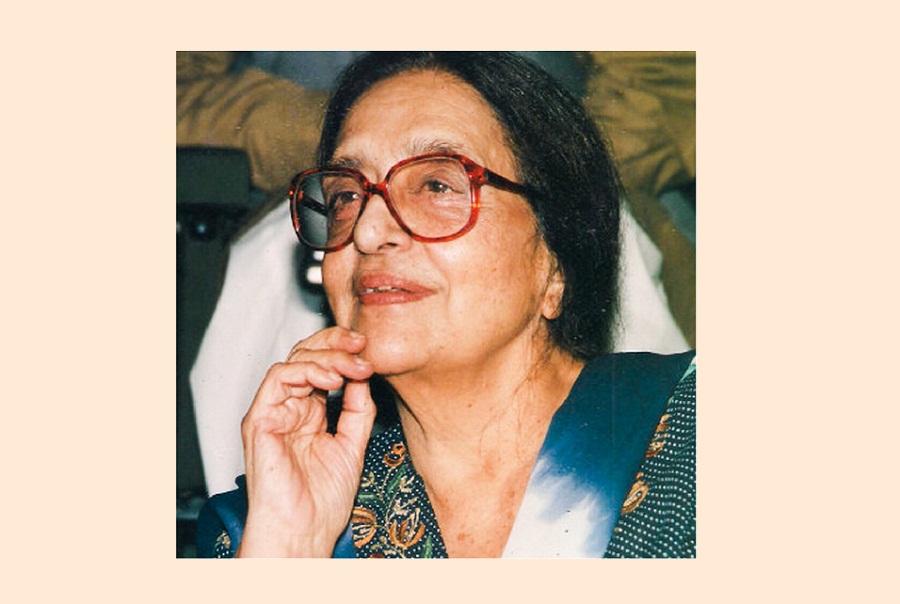Tahira Mazhar Ali Khan: The woman who led the first protest march in 1971 from Pakistan

Published :
Updated :

Bangladesh had a genuine friend in Tahira Mazhar Ali Khan. She was detained in her nation, Pakistan, for opposing the genocide committed against the people of Bangladesh.
In 1971, she led Lahore's first anti-genocide protest march. She was attacked as a traitor and spat in her face by dictatorial representatives at the event. However, she was unable to leave the human stance. That's how her life is; she struggles.
It is hard to comprehend how she deliberately sacrificed her colourful life and stood up for the ordinary people. In contrast, others would not think twice about changing their beliefs to preserve a slight financial advantage and social standing.
She was active in progressive political causes throughout her life. Tahira Mazhar Ali Khan's father, Sikandar Hayat Khan, served as Punjab's chief minister while still a single state.
She rejected her father's choice, Mumtaz Daultana, and married unemployed Mazhar Ali Khan when she was seventeen. Mazhar Ali Khan went on to become a talented journalist and writer. He was also a labour and peasant organizer who was quite active.
Tahira and Mazhar were cousins in a familial relationship. After marriage, both of them defied family customs and became more active in the political battles of the average citizenry.
The Progressive Writers' Association was established in Tahira-Mazhar's home in Lahore. Ahmed Nadeem Kashmi, Sajjad Zaheer, and Faiz Ahmad Faiz founded this organization.
Tariq Ali Khan, a well-known journalist and political activist, is their first son. Despite the fluctuations in global politics, including the fall of socialism, Tahira and her spouse remain hopeful about a life of hardship.
Tahira was at the forefront of this generation's protest activities until her death in March 2015 at 70.
Nearly every anti-autocratic campaign, from Ayub Khan to Ziaul Haq, was led by Tahira and Mazhar Ali Khan. In 1948, Tahira took the initiative to officially observe Women's Day in Pakistan for the first time, and several vivacious women joined her.
She also urged the founding of the Pakistan Democratic Women's Association. She understood that the working-class struggle was essential to the women's movement.
Thus, she brought together Pakistan's labour and women's rights movements. Due to her political expertise and knowledge, prominent women, including Benazir Bhutto, consulted her before judging numerous problems.
Before the creation of the Awami Workers Party, a coalition of three communist groups, she served as the senior vice president of the Pakistan National Workers Party. Tahira and her husband had a personal friendship with Zulfikar Ali Bhutto. However, they consistently criticized his reactionary work from an ideological standpoint.
When Bhutto took office, Tariq Ali was already outside of Pakistan. Bhutto forbade Tariq Ali from entering Pakistan after taking office out of political fear. Tahira accused Bhutto of forsaking the ordinary people, which led to her lifting the restriction.
It was not just in 1971 that Tahira Mazhar Ali Khan stood with the Bengalis in peril. To aid during the 1943 famine, she sent her priceless jewellery and ornaments to the Lahore relief fund.
Her husband has demonstrated instances of distributing his wealth. 'View Point' was the name of the journal Mazhar Ali Khan once published. Who had an office at his home in the heart of Lahore?
March 23, 2015, was her death date. After her death, there was no such expression of grief and respect from Bangladesh as workers and women's activists in Pakistan and India. Nonetheless, in 2013, she received the title of "Foreign friend of the Liberation War" in recognition of her gratitude.
tanjilatasnim180@gmail.com


 For all latest news, follow The Financial Express Google News channel.
For all latest news, follow The Financial Express Google News channel.